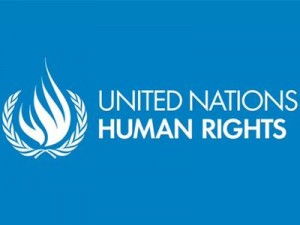
From 9-13 March, the Tibetan Centre for Human Rights and Democracy (TCHRD) had a team of two researchers at regular session of the United Nations Human Rights Council (HRC). Mr. Tenzin Nyinjey and Mr. John Gaudette, two senior researchers of the TCHRD participated at the ongoing UN Human Rights Council in Geneva under the name of International Fellowship of Reconciliation (IFOR). This is the second consecutive HRC regular session that TCHRD has sent a team to. At the previous session in September 2014, TCHRD’s Executive Director, Ms. Tsering Tsomo, raised the situation in Tibet.
This year the TCHRD team built upon the work from September 2014. TCHRD’s team met with assistants for the Special Rapporteurs on the right to freedom of peaceful assembly and association, the right to health, and the right to education. TCHRD also met with a representative from the Office of the High Commissioner for Human Rights (OHCHR). At all of these meetings TCHRD gave briefings on the situation in Tibet and provided digital and paper copies of TCHRD’s 2014 Annual Report and special reports on the right to health and the right to education. During the meetings the representatives of the Special Rapporteurs and the OHCHR said they would act on the situation in Tibet as permitted by the limits of their respective mandates. TCHRD also participated in a panel discussion with the Special Rapporteur on Freedom of Religion and Belief on Friday.
TCHRD’s team also sat in on the plenary sessions of the HRC and various side events and informal meetings organized by governments and NGOSs. TCHRD was encouraged to see States at the HRC working to protect human rights defenders, end reprisals against people who cooperate with the UN mechanisms, commit to zealous enforcement of human rights and rule of law, and to be considering the creation of a Special Rapporteur on the right to privacy.
TCHRD’s presence at the HRC is aimed at highlighting China’s human rights violation in Tibet, seeking support and establishing networks with NGOs, diplomats and the UN Special Procedure mandate holders. Working with other NGOs at the HRC, this approach will allow Tibetan organizations to take full advantage of the international human rights system. Much of the work by the HRC and the Special Procedures is low-key and progresses slowly but steadily. In other situations it has proven to be an effective forum for improving human rights. TCHRD’s presence at the HRC is designed to ensure the Tibetan community can effectively utilize the international human rights system.
